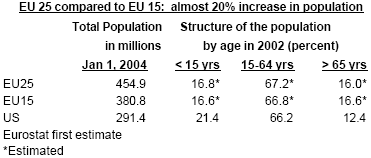



International Egg and Poultry Review
US - By the USDA's Agricultural Marketing Service - This is a weekly report looking at international developments concerning the poultry industry, this week looking at the EU expansion.
EU Expansion
On May 1 Cyprus, the Czech Republic, Estonia, Hungary, Latvia, Lithuania, Malta, Poland, the Slovak Republic, and Slovenia are to join the European Union. The EU will have 25 member countries creating
the world's third largest territorial unit.
The EU-25 will have 450 million inhabitants, compared to 300 million in the U.S. The EU-15 already accounts for 20 percent of world trade and accounts for more than 25 percent of the world's Gross Domestic Product.

The new member countries have a level of income about half of that of the EU-15, but income growth rates are about 2-3 times that of the EU-15. The Gross Domestic Product (GDP) of the new countries are
significantly lower than in the EU-15. As a percent of the EU average, the differences ranged from a low of 28 percent in Lithuania up to 83 percent in Cyprus in 2001. Data was not available for Malta. Agricultural share of employment was highest in Poland (19.2), Lithuania (16.5) and Latvia (15.1) and lowest in Malta (2.3), Cyprus (4.8) and the Czech Republic (4.6).
Hungary, Poland, Estonia, the Czech Republic, Slovenia and Cyprus
began accession negotiations on March 31, 1998. Negotiations began
on October 13, 1999 for Romania, the Slovak Republic, Latvia,
Lithuania, Bulgaria and Malta. On May 1, 2004, the 10 new member
countries will have to implement 80,000 pages of regulations known
as the “acquis communautaire.” Romania and Bulgaria are expected
to accede in 2007.
Several countries have processing plants, dairies and slaughterhouses
that don’t meat EU hygiene standards. In mid-April the EU granted
transition periods to some 1,000 establishments, which will be allowed
to continue selling food in their home member state. Products deemed
below EU norms will be stamped with a special mark to ensure they
are not sold outside the domestic market.
As of May 1, 2004, B class eggs (eggs over 20 days old, up to six
months) will not be permitted to be sold in supermarkets. They must
be sold to the food industry to be pasteurized. All class A eggs (fresh
eggs) sold in supermarkets will need to have a certification stamp on
their shell for traceability under the EU directives of food safety.
U.S. poultry exports to the new member countries will fall dramatically
due to stricter import policies in the EU. During most of the 1990s, the
U.S. was the principal supplier of poultry meat to Poland and the Baltic
States. Poultry meat exports are allowed to tranship through the EU,
and mostly consist of chicken leg quarters, legs, feet (paws) and
mechanically separated turkey. Most of the meat was shipped to Greece
and the Netherlands and goes to the countries of the former Soviet
Union.
To view the full report, including tables please click here (PDF Format)
Source: USDA's Agricultural Marketing Service - 20th April 2004








